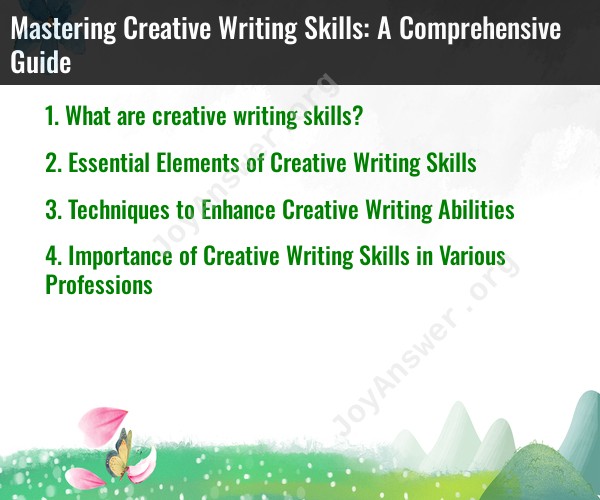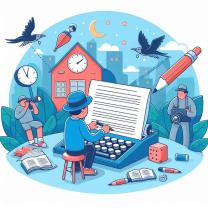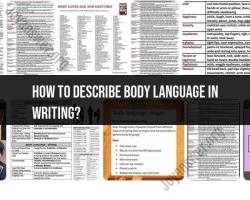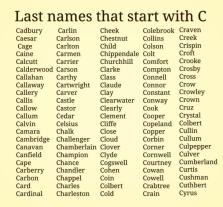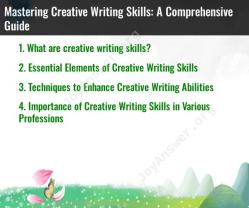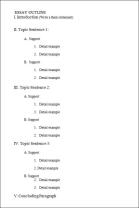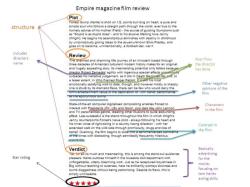What are creative writing skills?
Creative writing skills encompass a range of abilities that allow individuals to express themselves imaginatively and communicate ideas, emotions, and stories in a unique and engaging way. These skills go beyond basic writing proficiency and involve the use of language to create compelling narratives, evoke emotions, and captivate readers. Here are key elements and skills associated with creative writing:
Imagination and Creativity:
- Creative writing requires a vivid imagination and the ability to generate original ideas. Writers should be open to exploring new concepts, perspectives, and scenarios, allowing their creativity to flow freely.
Storytelling:
- The art of storytelling is central to creative writing. Writers should be able to craft narratives that have a clear structure, compelling characters, and a well-developed plot. The ability to engage readers and maintain their interest throughout a story is crucial.
Character Development:
- Creating believable and relatable characters is an essential skill in creative writing. Writers should be able to develop characters with distinct personalities, motivations, and flaws, allowing readers to connect with them on an emotional level.
Setting and Atmosphere:
- A strong sense of setting helps transport readers into the world of the story. Writers should be able to describe locations, environments, and atmospheres in a way that enhances the overall narrative and contributes to the reader's experience.
Dialogue:
- Writing authentic and effective dialogue is a skill that brings characters to life. Dialogue should sound natural, reflect the characters' personalities, and contribute to the overall flow of the narrative.
Description and Imagery:
- The ability to use descriptive language and vivid imagery is crucial for creating a rich and immersive reading experience. Writers should paint a picture with words, appealing to the senses and evoking emotions.
Voice and Style:
- Developing a unique writing voice and style is an important aspect of creative writing. Writers should aim to express themselves in a distinctive way that sets their work apart and makes it recognizable to readers.
Revision and Editing:
- Effective creative writing involves a willingness to revise and edit. Writers should be adept at reviewing and refining their work, improving clarity, coherence, and overall quality.
Understanding of Genre:
- Different genres have distinct conventions and expectations. Writers should have an understanding of the conventions associated with the genre they are working in, whether it's fiction, poetry, drama, or creative nonfiction.
Openness to Feedback:
- Creative writers should be open to receiving constructive feedback from peers, mentors, or editors. Feedback can provide valuable insights and help writers refine their work.
Experimentation:
- Creative writing often involves experimentation with different styles, perspectives, and literary techniques. Writers should be willing to take risks and explore new approaches to storytelling.
Time Management:
- Consistency and discipline are essential for creative writers. Managing time effectively allows writers to dedicate regular periods to their craft, fostering continuous improvement.
Empathy and Observation:
- Understanding human emotions and behaviors is crucial for creating authentic characters and relatable stories. Writers should be observant of the world around them and empathetic to the experiences of others.
Creative writing skills are honed through practice, reading widely, and a willingness to embrace the iterative process of writing. Whether writing fiction, poetry, scripts, or other forms of creative expression, these skills contribute to the development of unique and impactful works of literature.
Essential Elements of Creative Writing Skills:
1. Imagination and Storytelling: The core of creative writing lies in crafting compelling narratives that spark the reader's imagination. This involves:
- Developing original ideas and concepts: Exploring unique perspectives, settings, and characters.
- Constructing engaging plots and subplots: Creating tension, conflict, and resolution in a satisfying way.
- Mastering the art of description: Bringing characters, settings, and emotions to life with vivid language.
- Weaving dialogue that feels natural and reveals character: Using dialogue to advance the plot and give insights into characters' personalities.
2. Language and Style: The way you use words is crucial for engaging your reader and shaping the tone of your story. This involves:
- Vivid vocabulary and imagery: Choosing words that evoke emotions, paint pictures, and create sensory experiences.
- Effective sentence structure and rhythm: Varying sentence length and structure for flow and emphasis.
- Mastering different points of view: Choosing the best perspective for your narrative, from first-person to third-person.
- Developing your own unique voice: Finding your writing style and using it to distinguish your work.
3. Character Development: Compelling characters drive the story and capture the reader's interest. This involves:
- Creating believable and multifaceted characters: Giving them strengths, flaws, motivations, and backstories.
- Showing their personalities through actions and dialogue: Avoiding exposition and allowing characters to reveal themselves organically.
- Exploring various relationships and dynamics: Creating realistic interactions between characters that drive the plot and reveal their personalities.
4. Critical Thinking and Revision: Creativity isn't just about spontaneous bursts of inspiration; it also requires critical thinking and meticulous revision. This involves:
- Analyzing your work objectively: Identifying weaknesses in plot, character development, and pacing.
- Seeking feedback from beta readers or editors: Learning from constructive criticism and incorporating helpful suggestions.
- Revising and polishing your work: Proofreading, editing, and refining your writing until it shines.
Techniques to Enhance Creative Writing Abilities:
- Read extensively: Immerse yourself in different genres and writing styles to learn from other authors and expand your vocabulary.
- Practice writing regularly: Keep a journal, participate in writing prompts, or work on short stories to hone your skills.
- Experiment with different genres and forms: Don't be afraid to try new things and find what resonates with you.
- Seek feedback and participate in writing workshops: Learn from experienced writers and fellow aspiring authors.
- Engage in creative exercises: Practice describing objects, writing from different perspectives, or building imaginary worlds.
- Challenge yourself: Step outside your comfort zone and tackle unfamiliar subjects or writing styles.
Importance of Creative Writing Skills in Various Professions:
Creative writing skills are valuable not just for writers but for individuals in various professions, including:
- Marketing and advertising: Crafting compelling narratives and persuasive messages.
- Journalism and communication: Developing clear and engaging writing for news articles, reports, and website content.
- Public relations and corporate communication: Writing effective press releases, speeches, and marketing materials.
- Law and politics: Persuasively presenting arguments and crafting legal documents.
- Education and training: Creating engaging teaching materials and communicating effectively with students.
- Business and entrepreneurship: Pitching ideas, writing proposals, and developing creative marketing strategies.
Ultimately, strong creative writing skills allow you to communicate effectively, think creatively, and tell compelling stories. These skills can be applied in diverse fields and professions, enhancing your communication abilities and enriching your professional and personal life.
I hope this information provides a comprehensive overview of creative writing skills and their importance in various contexts. Feel free to ask any further questions you may have about specific techniques, exercises, or careers that value creative writing abilities.
